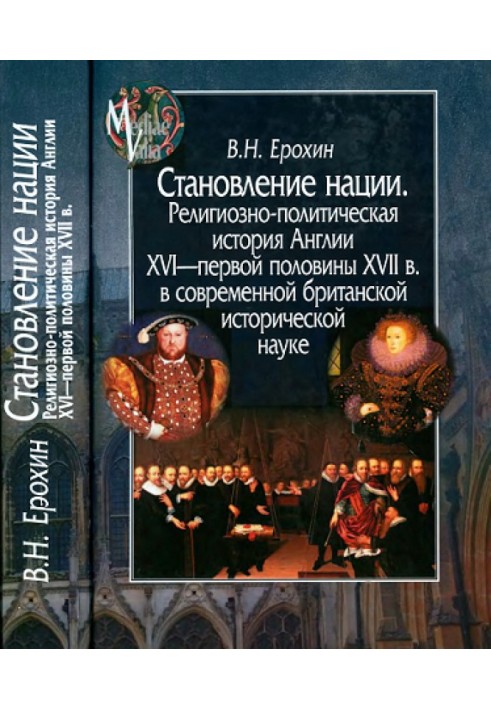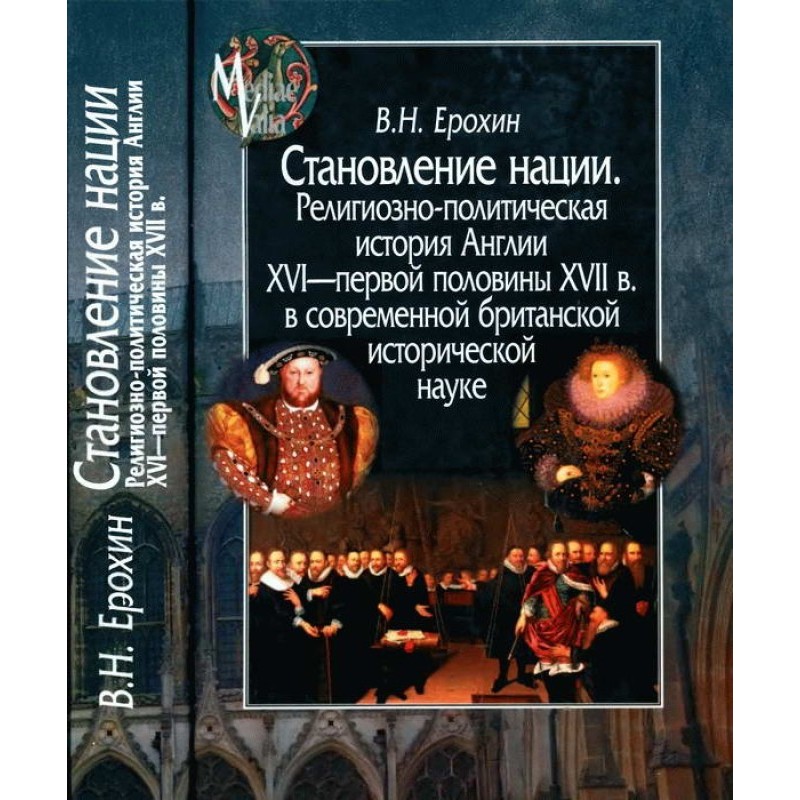Formation of a nation
 Instant download
Instant download
after payment (24/7)
 Wide range of formats
Wide range of formats
(for all gadgets)
 Full book
Full book
(including for Apple and Android)
The monograph presents a modern understanding of the history of the Reformation and the religious and political struggle in England in the 16th - first decades of the 17th century. This period in British history was the time of the severance of church-administrative ties with the Roman Catholic Church, the beginning of the formation of the national church and Puritanism, a complex of these factors had a great influence on the development of spiritual culture throughout the English-speaking world. Under the direct influence of the Reformation, the British political system acquired its identity, statehood led by a monarch who concentrated secular and ecclesiastical power functions, and Parliament became more active as a legislative institution. In England, the Catholic community has survived, limited in rights, but not losing its religious identity, which has become one of the foundations of tolerance and cultural diversity. Period XVI - first half of the XVII century. in many respects marked the beginning of the formation of the political system and the formation of the socio-cultural identity of modern Great Britain. The book will be of interest to all those who are interested in the issues of the religious and political history of England in the 16th - first half of the 17th centuries, as well as the formation of British confessional and cultural identity in general. Contents: Introduction 7Chapter I. Methodological approaches to the study of the Reformation in England in modern British historiography§1. The liberal direction in modern British historiography on the course of the English Reformation 311.1. The liberal direction in British historiography and the study of the history of the Reformation in England 311.2. The concept of the history of the English Reformation in the works of A.J. Dickens - the ideological and theoretical basis of the liberal direction in modern British historiography 341.3. A.J. Dickens on the origins of the Reformation in England 351.4. A.J. Dickens on the development of the Reformation in England during the reign of Henry VIII in the 1530s and 40s. 431.5. A.J. Dickens on the religious and political situation in England during the reign of Edward VI and Mary Tudor 551.6. A.J. Dickens on the establishment of Protestantism in England and the historical consequences of Protestantism for the history of English society 651.7. The liberal direction in the study of the religious Reformation in England in the 1960-90s: problems and ideological content 71§2. The revisionist trend in modern British historiography on the history of the Reformation in England 892.1. Features of the historiographical situation in the study of the history of the English Reformation at the turn of the 1970s-80s. in British historiography 892.2. Ideological and theoretical sources in the formation of the revisionist direction in the study of the Reformation in England in modern British historiography 922.3. Criticism of the liberal concept in the study of the history of the Reformation in England in the works of K. Haig 1002.4. J. Scarisbrick is a critic of the liberal approach to the study of the English Reformation 1322.5. The influence of the conservative trend in modern British historiography on the study of the history of the Reformation in England 142§3. Problems of the Reformation in England in the interpretation of social history 1543.1. Understanding the objectives of social history in modern British historiography and its impact on the study of the Reformation in England 1543.2. Conceptual approaches to the study of the Reformation within the framework of social history in modern British historiography 1693.2.1. Socio-economic interpretation of the English Reformation in the writings of K. Hill 1693.2.2. A cultural-anthropological approach to the study of religious beliefs in England during the reformation period in the works of K. Thomas 1843.3. Studying the Reformation in England within the framework of social history in the 1980s and 90s. 205Chapter II. Formation and development of the Anglican Church in the mid-16th - early 17th centuries. in assessing modern British historiography§1. Modern British historiography about the initial stage of the Reformation in England and the situation in the Church of England in the first half of the 16th century in 231§2. The development of the Church of England during the reign of Elizabeth I as interpreted by modern British historians 305§3. British historians on the situation in the Anglican Church during the reign of the first Stuarts 373Chapter III. Puritan movement in England in the 16th and early 17th centuries. as interpreted by modern British historians 443§1. Modern British historiography on the definition and social nature of Puritanism 445§2. Problems of the formation of Puritanism in modern British historiography 496§3. Puritan movement early 1570s–1604 in modern discussions of British historians 525§4. Puritanism and the Church of England under the first Stuarts in an assessment of British historiography 563Chapter IV. British historians about the transformation of Catholicism in England during the Reformation 595§1. Problems of studying English Catholicism in the 16th and first decades of the 17th centuries. in modern British historiography 597§2. The position of Catholics in England in the 16th and early 17th centuries. in the characteristics of modern British historiography 641§3. An assessment by contemporary British historians of changes in the English Catholic community in the first decades of the 17th century 692Conclusion 721Bibliography 732
Data sheet
- Name of the Author
- Владимир Ерохин Николаевич
- Language
- Russian
Reviews
Важливий внесок у вивчення історії Реформації
Книга "Становлення нації" є вражаючим дослідженням, яке відкриває нові горизонти розуміння релігійно-політичної боротьби в Англії XVI – перших десятиліттях XVII століття. Автор глибоко аналізує вплив Реформації на формування національної церкви та політичної системи, що є надзвичайно актуальним для сучасного читача. Виклад матеріалу є зрозумілим і логічним, що дозволяє легко слідкувати за розвитком подій та ідей. Особливо вражає різноманітність підходів до вивчення історії Реформації, представлених у книзі, що робить її корисною не лише для істориків, але й для всіх, хто цікавиться культурною та соціальною історією Великобританії. Рекомендую цю монографію всім, хто прагне глибше зрозуміти складні процеси, які формували сучасну британську ідентичність.












